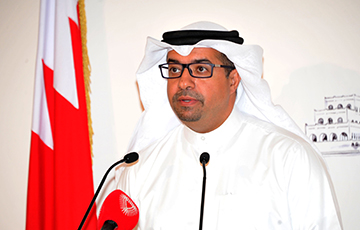ID :
386845
Mon, 11/09/2015 - 21:41
Auther :
Shortlink :
http://m.oananews.org//node/386845
The shortlink copeid
Government stresses zero-tolerance towards violators

Manama, Nov.9 (BNA): Information, Parliament Affairs Minister Isa Abdulrahman Al-Hammadi stressed that Bahrain has established a leading model in the implementation of the observations mentioned in the National Audit Office (NAO) report.
Addressing the local medial following the weekly Cabinet session, the minister underlined the government's firm stance in dealing with the NAO's observations aimed at preserving public funds, developing the performance of government institutions and ensuring the ideal use of the available resources.
He added the government will take the necessary measures against those who are proven involved in offenses requiring judicial intervention and stressed there is no immunity for violators.
He said the government deals with NAO's reports in accordance with a clear methodology, where some of the NAO's reports and observations are referred to the public prosecution, and others to the General Director of Anti-corruption and Economic and Electronic Security at the Ministry of Interior to investigate them and take legal action. Other reports are dealt with as administrative irregularities which are to be corrected through restructuring the procedures.
In response to media reports about the financial situation of the Bahrain Livestock Company, the minister said that it is too early to address the situation of a commercial enterprise based on press statements, adding there is a law to deal with the financial situations of trade companies and businesses to protect the shareholders' rights.
Ministry of Health's Assistant Undersecretary for Hospital Affairs Dr. Waleed Al Manea was also present during the press briefing to deliver a presentation on the best ways to prevent the spreading of cholera.
He said that the ministry is following the developments of the cases of cholera in Iraq and the recommendations of the World Health Organisation (WHO) on the disease.
“An integrated plan on cholera had been devised in the kingdom to ensure early detection of cases and taking the necessary procedures to prevent the spread of the disease," he said.
“Under the plan, medical staff has been informed about ways to detect suspicious cases through providing them with basic information about the disease, as determined by the WHO, reporting the cases to the Public Health Directorate at the Ministry of Health as well as ways to collect and analyse samples from patients.”
Dr Al Manea said the Ministry of Health's plan also included measures to prevent infection, treatment methods, plans for raising awareness among the public about the disease and communication with the relevant officials in charge of the kingdom's air and land exits where food and liquids coming from Iraq were denied entry.
“In Bahrain, 55 were suspected cases coming from Iraq, and after a close follow-up only eight cases, including the one detected in Kuwait, were confirmed and all were fully treated," he said.
“Cholera can be transmitted by food or water contaminated with the bacterium Vibrio cholera. That is why it is very essential for the travellers to Iraq to use bottled drinking water, avoid eating raw fruits and vegetables and eat food only from clean restaurants.
“It is important to constantly wash your hands with clean water, especially before eating and after using the bathroom. People also need to take care of their personal hygiene," said Dr Al Manea.
He added that staying clean all the time, drinking bottled water and eating from clean restaurants are far more effective than vaccination.





